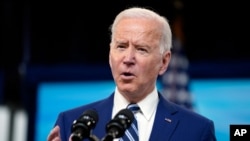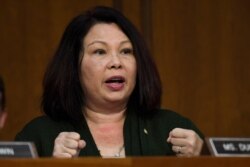More actions have been announced by the White House in response to criticism that President Joe Biden is not sufficiently responding to a surge in hate incidents against Asian Americans, as well as the lack of Asian American Pacific Islander (AAPI) representation in his two-month-old administration.
Among the announcements Tuesday: A White House Initiative on Asian Americans and Pacific Islanders is being reinstated and expanded. It was initially established during the administration of President Bill Clinton.
“Prior to Tuesday, the White House had not taken action to reinvigorate WHIAAPI,” said the AAPI Progressive Action advocacy group. “AAPI activists have argued that the initiative should be moved to an agency which is better equipped to address the health and public safety issues faced by Asian Americans.”
Biden will also appoint a coordinator of such policies across the federal government. Community advocates had made such a request.
The White House is also allocating about $50 million for AAPI survivors of domestic violence and sexual assault and for a multiagency initiative to address rising hate crimes against the community.
Some of the funds will also go to establish a COVID-19 Equity Task Force to address xenophobia against Asian Americans, who as a community have been the hardest hit economically by the coronavirus pandemic.
These are steps “in the right direction, but how this all sort of cascades down remains to be seen,” said Jeff Le, a Truman National Security Project fellow.
“In the coming weeks, the administration will meet with AAPI leaders to hear their input in how we can play the most constructive role possible in the community,” White House Press Secretary Jen Psaki told reporters on Tuesday. “And the president raised — because he felt it was imperative to elevate — the continuing threats, the hate speech, and the violence against the Asian American community in his speech he gave during a primetime address a week ago.”
The White House was surprised recently to find itself facing criticism from prominent Asian American lawmakers in the president’s own party for a lack of representation. The comments followed a pair of shootings by the same gunman in Atlanta, Georgia, in which six Asian American women were among those killed. The attacks on three day spas prompted community protests there and in other U.S. cities.
The administration thought it had secured credibility among Asian Americans with Biden’s selection of Kamala Harris, whose mother emigrated from India, as his running mate and now vice president.
“The folks in the administration actually brought up her name and said, ‘Well, you have Kamala, you don’t need really any other Asians in the cabinet,’” Senator Tammy Duckworth told CBS on Monday. “And, I thought, wow, that’s really offensive. You wouldn’t say, ‘we have a white male president. There shouldn’t be any more white male members of the cabinet.’ Why would you say that to someone from the Asian community?”
Duckworth, of Illinois, and Mazie Hirono of Hawaii — both Democrats — have been the most vocal members of Congress expressing concern about the lack ethnic Asian representation in the Biden administration at a time of a rising number of attacks reported on members of the AAPI community.
The two senators had vowed to oppose further Biden nominees until a significant plan was unveiled to address Asian American issues.
The threat was dropped after Duckworth said the White House last week made a commitment to appoint a senior White House official focused on Asian American issues.
The community will be closely watching to see if the person appointed by Biden has the clout and experience — and is given resources — to adequately address its concerns, Le, of the Truman National Security Project, told VOA on Tuesday.
“I would say there’s sort of a palpable fear in the air and this is reaching an existential crisis for many communities across the country,” said Le, who was a deputy cabinet secretary to former California Governor Jerry Brown.
The crime wave against Asian Americans is continuing with two brutal new assaults in New York City, which were recorded on video. Police say they are investigating the attacks as hate crimes.
In one of the attacks, in which a lone assailant kicked in the stomach a 65-year-old Asian woman, bystanders failed to intervene.
The video revealed an act that was “absolutely disgusting and outrageous," said New York City Mayor Bill de Blasio who called it “absolutely unacceptable” that witnesses did not try to help the woman. “If you see someone being attacked, do whatever you can.”
A nonprofit organization connecting Asian Americans to digital organizing, 18 Million Rising, said while it is “glad to see the Biden administration acknowledge and condemn the rise in anti-Asian violence” it disagrees “with some of the proposed responses shared in today’s statement” by the White House.
The group, in a statement to VOA, expressed concern that “anti-Asian violence and xenophobia are being met with increased funding for law enforcement by the Biden administration,” pointing out that numerous progressive Asian American organizations are “demanding community-centered solutions instead of increased funding and training for the FBI and other law enforcement.”
One in four Asian Americans has experienced a hate incident, while more than two-thirds have been asked "where they're really from," according to a poll from Survey Monkey and AAPI Data published Tuesday.
“I don't think people are going to just take it anymore,” said Le. “You're seeing that sort of awakening, partly from the recent election cycles, but also an acknowledgement it's no longer okay to just to be happy with what you're offered, it's that you really have to fight to be at the table and that goes not just politically but also just in your day-to-day living.”
There are about 20 million Asian Americans in the United States — nearly 6% of the total population.
One encouraging sign for the AAPI community is the inclusion of several Asian Americans among federal judicial nominees announced Tuesday by the White House.
“Two were previously nominated in the Obama administration, and we believe that they would contribute immediately to the federal bench,” John Yang, president and executive director of Asian Americans Advancing Justice, said in statement to VOA.
“At the same time, we continue to press the Biden administration to ensure that Asian Americans are represented in the senior-most levels of the federal government."








